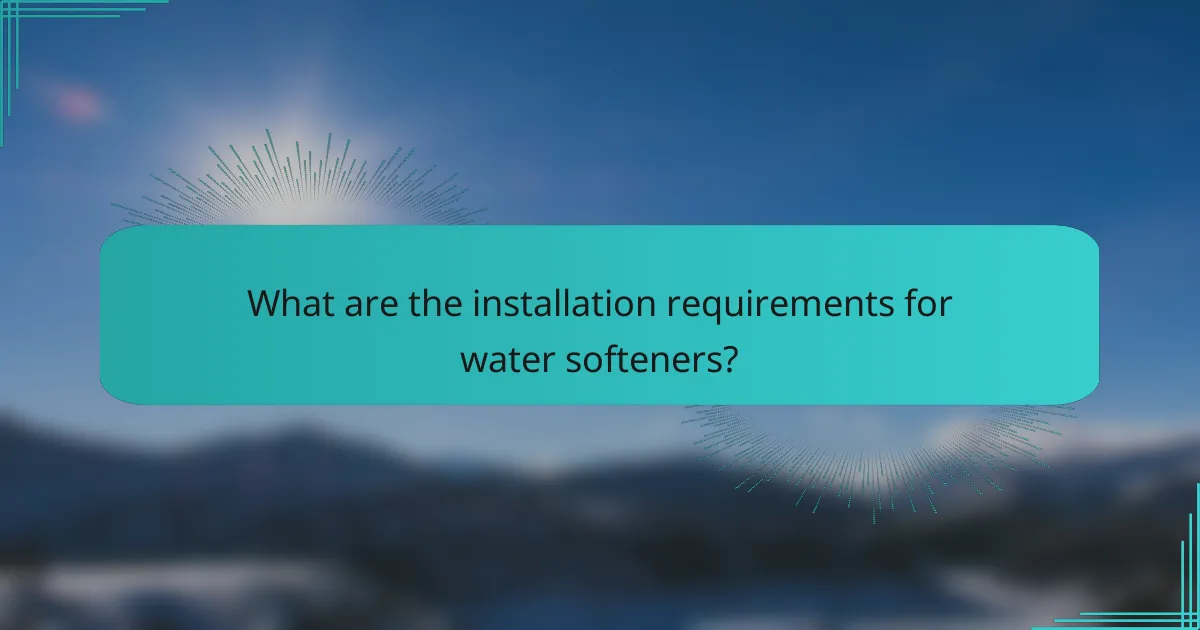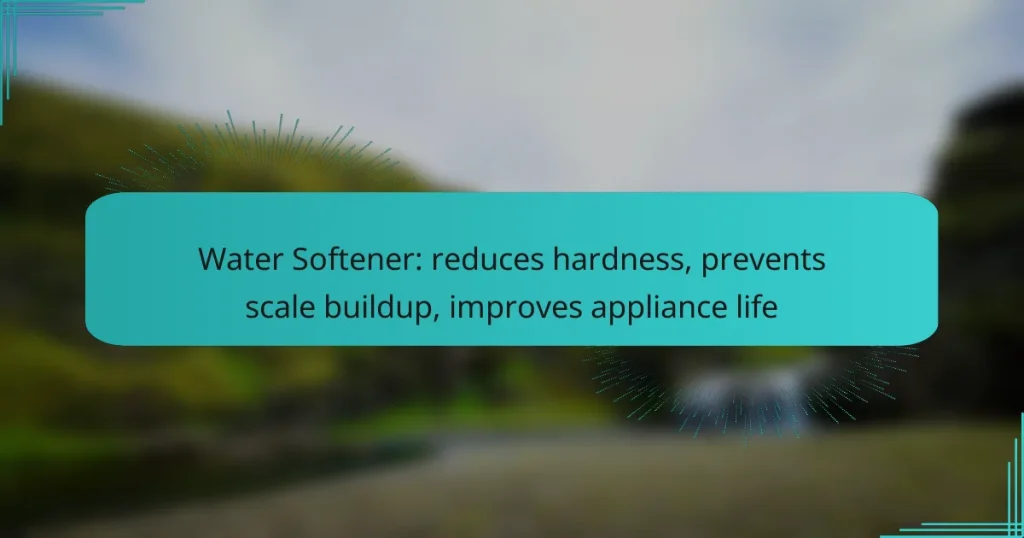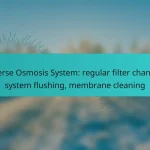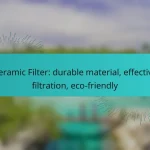A water softener is an essential device that effectively reduces water hardness by eliminating minerals such as calcium and magnesium. This not only prevents scale buildup in plumbing and appliances but also enhances their longevity and improves overall water quality, leading to a more efficient and cost-effective home environment.

How does a water softener reduce hardness?
A water softener reduces hardness by removing minerals like calcium and magnesium from the water supply. This process helps prevent scale buildup in plumbing and appliances, ultimately extending their lifespan and improving water quality.
Ion exchange process
The ion exchange process is the primary method used by water softeners to reduce hardness. In this process, hard water flows through a resin bed filled with sodium ions. As the hard water passes through, calcium and magnesium ions are exchanged for sodium ions, effectively softening the water.
This method is efficient and can handle varying levels of water hardness. Regular maintenance, such as replenishing the sodium supply, is necessary to ensure the system continues to function effectively.
Replacement of calcium and magnesium
During the softening process, calcium and magnesium ions are replaced with sodium ions, which do not contribute to hardness. This replacement not only softens the water but also helps prevent the formation of scale in pipes and appliances.
For households with hard water, this replacement can significantly reduce the frequency of plumbing issues and appliance repairs, saving both time and money in the long run.
Improved water quality
Softened water improves overall water quality by reducing the presence of scale-forming minerals. This leads to cleaner dishes, brighter laundry, and less soap scum in bathrooms. Additionally, soft water can enhance the effectiveness of soaps and detergents.
As a result, households may notice a decrease in cleaning product usage and an improvement in the taste of drinking water. Overall, the benefits of improved water quality contribute to a more comfortable and efficient living environment.

What are the benefits of using a water softener in the UK?
Using a water softener in the UK provides several advantages, including reduced hardness in water, prevention of scale buildup, and improved longevity of household appliances. These benefits lead to enhanced efficiency and lower maintenance costs for homeowners.
Prevents scale buildup in appliances
A water softener effectively reduces the hardness of water, which is primarily caused by minerals like calcium and magnesium. By softening the water, it prevents the formation of scale deposits in appliances such as kettles, dishwashers, and washing machines.
Scale buildup can significantly hinder appliance performance and efficiency, leading to higher energy consumption and more frequent repairs. Softened water helps maintain optimal operation, extending the life of these essential household devices.
Extends lifespan of plumbing systems
Hard water can cause mineral deposits to accumulate in pipes, leading to clogs and reduced water flow. By using a water softener, homeowners can mitigate these issues, ensuring that plumbing systems remain clear and functional for longer periods.
Regular maintenance of plumbing systems is costly, and softened water reduces the frequency of repairs needed. This proactive approach can save homeowners money in the long run while ensuring reliable water delivery throughout the home.
Enhances soap and detergent efficiency
Softened water improves the effectiveness of soaps and detergents, allowing them to lather better and clean more efficiently. This means that less product is required for the same cleaning results, which can lead to cost savings over time.
In the UK, using a water softener can reduce the amount of detergent needed by up to 50%, making laundry and dishwashing more economical. Additionally, this efficiency helps prevent soap scum buildup, keeping surfaces cleaner and reducing the need for harsh cleaning chemicals.

How do I choose the right water softener?
Choosing the right water softener involves assessing your household’s water usage, understanding the types available, and considering your budget. The ideal system will effectively reduce hardness, prevent scale buildup, and enhance the lifespan of your appliances.
Capacity based on household size
The capacity of a water softener is crucial and should match your household size and water consumption. A typical guideline is to choose a system that can handle 30,000 to 50,000 grains for a family of four, depending on water hardness levels.
To estimate your needs, consider the number of people in your home and their daily water usage. For instance, a household of four may use around 400 gallons per day, which requires a larger capacity softener to maintain efficiency.
Types of water softeners available
There are several types of water softeners, including salt-based, salt-free, and dual-tank systems. Salt-based softeners are the most common and effectively remove hardness through ion exchange, while salt-free systems use alternative methods to condition water without removing minerals.
Dual-tank systems are ideal for larger households as they provide continuous soft water by alternating between tanks. Each type has its advantages, so consider your specific needs and preferences when selecting a system.
Cost considerations
The cost of water softeners varies widely based on type, capacity, and features. Basic salt-based systems can start around $400, while more advanced models may exceed $2,000. Additionally, factor in ongoing costs for salt and maintenance.
It’s wise to compare the total cost of ownership, including installation and operational expenses, to find a system that fits your budget. Look for models with warranties and good customer reviews to ensure long-term satisfaction.

What are the installation requirements for water softeners?
Installing a water softener requires specific space, plumbing, and electrical considerations to ensure optimal performance. Proper planning can help avoid common issues and ensure that the system operates efficiently.
Space and plumbing considerations
Water softeners need adequate space for installation, typically in a basement, garage, or utility room. Ensure there is enough room for maintenance access and that the unit is placed near the main water supply line.
Plumbing connections are crucial; you will need to connect the softener to both the cold water supply and the drain. It’s advisable to have a bypass valve installed to allow for easy maintenance without disrupting the water supply.
Electrical requirements
Most water softeners require a standard electrical outlet to power the control unit. Ensure the outlet is within reach of the unit and meets local electrical codes.
Some models may have additional requirements, such as a dedicated circuit. Always check the manufacturer’s specifications to avoid electrical issues during operation.
Maintenance needs
Regular maintenance is essential for water softeners to function effectively. This includes checking and replenishing the salt levels in the brine tank, which should be done every few weeks depending on usage.
Additionally, periodic cleaning of the resin tank and checking for any leaks or malfunctions can help prolong the life of the system. Following the manufacturer’s maintenance schedule will ensure optimal performance and prevent costly repairs.

What are the top water softener brands in the UK?
In the UK, leading water softener brands include Fleck, Harvey’s, and Water2Buy. These brands are recognized for their effectiveness in reducing water hardness, preventing scale buildup, and enhancing the lifespan of household appliances.
Fleck water softeners
Fleck water softeners are known for their durability and efficiency. They utilize a metered control system that ensures water is softened only when necessary, which can lead to cost savings on salt and water usage.
Common models like the Fleck 5600SXT are popular for their user-friendly digital controls and reliable performance. When choosing a Fleck system, consider the size of your household and the hardness level of your water to select the right capacity.
Harvey’s water softeners
Harvey’s water softeners are designed specifically for UK homes and are often praised for their compact size and ease of installation. They use a unique block salt system, which is convenient and reduces the mess associated with traditional salt bags.
These systems are particularly effective in areas with hard water, helping to extend the life of appliances and reduce limescale buildup. When considering Harvey’s, check for models that suit your water usage and hardness levels.
Water2Buy systems
Water2Buy offers a range of affordable water softeners that are suitable for various household sizes. Their systems are designed to be easy to install and maintain, making them a popular choice for DIY enthusiasts.
Models like the Water2Buy W2B800 are equipped with advanced features such as digital displays and programmable settings. It’s important to assess your water hardness and daily usage to select the right model for your needs.

How does water hardness affect my appliances?
Water hardness can significantly impact the efficiency and lifespan of household appliances. Hard water contains high levels of minerals, particularly calcium and magnesium, which can lead to scale buildup and reduced performance over time.
Impact on dishwashers
Hard water can cause mineral deposits to accumulate in dishwashers, leading to clogged spray arms and reduced cleaning efficiency. This buildup can result in dishes not being cleaned properly, requiring additional wash cycles.
To mitigate these effects, consider using a water softener, which can reduce hardness and prevent scale formation. Regular maintenance, such as cleaning filters and checking for buildup, can also help maintain optimal performance.
Effects on washing machines
Washing machines operating with hard water often experience reduced detergent effectiveness, leading to dingy clothes and increased wear on fabrics. Scale buildup can also affect the heating element, causing longer wash times and higher energy bills.
Using a water softener can enhance detergent performance and protect the machine from damage. It’s advisable to periodically check hoses and connections for signs of mineral buildup and replace them if necessary.
Consequences for water heaters
Water heaters can suffer from reduced efficiency and increased energy costs due to scale buildup from hard water. Over time, this can lead to overheating and premature failure of the heating element, resulting in costly repairs or replacements.
Installing a water softener can help extend the lifespan of your water heater by minimizing scale accumulation. Regular maintenance, such as flushing the tank, is also recommended to keep the system running efficiently.


